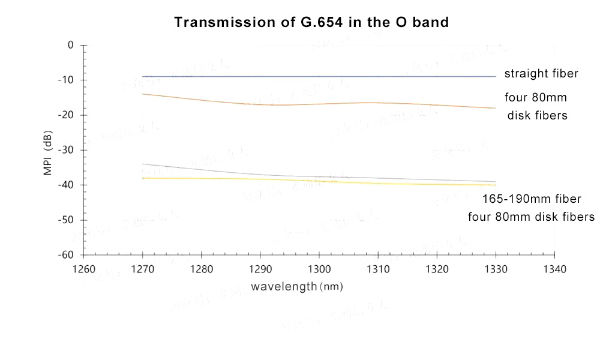Corning G.654C optical fiber is used for O-band transmission
- forrest86
- May 17, 2023
- 2 min read
Updated: Oct 22, 2025
G.654 optical fiber is usually designed for C-band transmission. The cut-off wavelength defined by the specification is 1530nm. The cut-off wavelength means that > this wavelength, the fiber is transmitted in single mode, and below this wavelength, the fiber is transmitted in this fiber. It is not guaranteed to be a single mode, and generally high-order modes will be excited.
G.652 is an ordinary single-mode optical fiber with a cut-off wavelength of 1260nm, and light greater than 1260nm exists in single-mode in the 652 optical fiber. The O-band is the window of 1260-1360nm, which is single-mode in 652 fiber.
But G.654 optical fiber, the cut-off wavelength is 1530nm, so the light greater than 1530nm can be guaranteed to be single-mode in 654, and the communication of C-band 1530nm-1565nm is indeed single-mode communication.
If 654 optical fiber is used to transmit O-band, it will excite high-order modes, such as LP11.

Corning submitted a set of data on OFC, record it, if the 654 optical fiber is laid in a straight line without bending, then the crosstalk caused by the difference in the transmission path of the high-order mode generated by MPI is very large, but the actual erection process of most optical fibers will be Leave a margin, such as a splice box, leaving a few laps of "coils" of fiber. If there are 4x80mm coils of fiber at both ends of the fusion, the MPI will decrease. If there are various bends and coils in the actual path, it will also It greatly reduces the multipath interference of MPI.


In the thick silicon circuit, I have talked about how thick silicon is used as a waveguide to easily excite high-order modes, and bending can be used to filter out high-order modes, which is the same principle.
If in fact the deployment of multipath interference can be controlled at -33dB, the power penalty caused by the high-order mode can be controlled at 0.2dB, basically unaffected.

Corning also gives the BER curves of the same optical module in 652 and 654 optical fiber transmission.







Comments